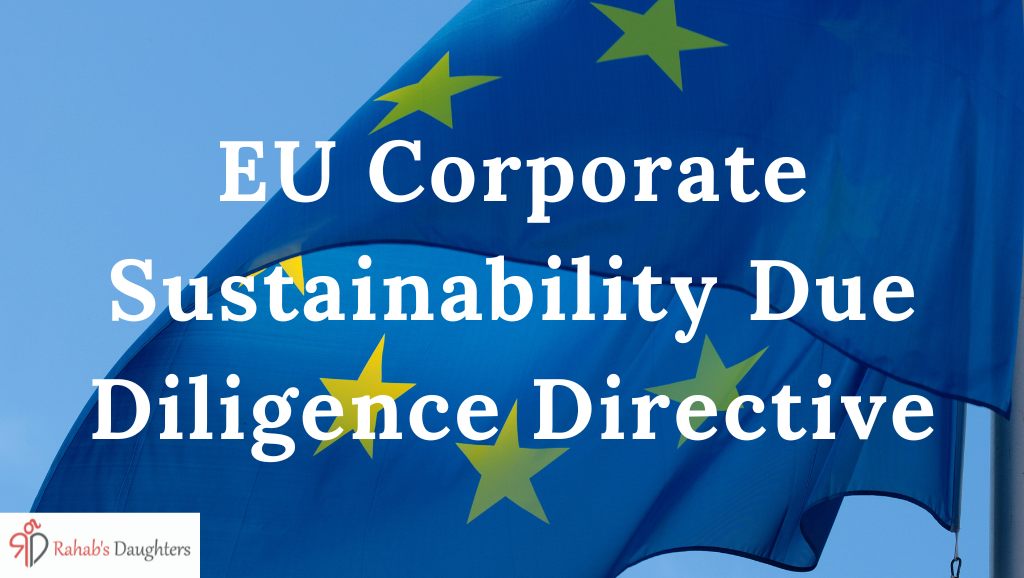The European Union (EU) has introduced a groundbreaking directive that impacts companies operating within its borders. The Corporate Sustainability Due Diligence Directive (CSDDD), which came into effect on July 25, 2024, establishes rigorous standards for businesses to address human rights and environmental risks in their operations and supply chains. This legislation carries far-reaching implications for EU businesses and non-EU companies—particularly those from the U.S. and UK—with significant operations in the EU.

The Scope of the CSDDD
The directive applies to:
• EU companies with over 1,000 employees and an annual turnover exceeding €450 million.
• Non-EU companies operating within the EU, provided they meet equivalent turnover thresholds related to their EU operations.
Businesses must now integrate due diligence practices to prevent, identify, and mitigate adverse impacts on human rights and the environment across their global value chains.
Implications for EU Businesses
1. Compliance Requirements
EU companies are required to adopt robust due diligence frameworks. These processes include risk assessments, preventive measures, and ongoing monitoring to address potential violations of human rights and environmental standards within their supply chains.
2. Operational Adjustments
Firms must implement enhanced reporting mechanisms and risk-management systems. For many, this may involve investing in new technologies or restructuring supplier relationships to meet the directive’s requirements.
3. Legal and Financial Risks
Non-compliance with the CSDDD can lead to significant penalties. Regulatory authorities will impose fines proportional to the company’s turnover, and businesses may face legal actions from stakeholders. This highlights the need for proactive adherence to the directive.
Implications for U.S. and UK Businesses Operating in the EU
1. Extended Jurisdiction
The directive’s reach includes non-EU companies that operate in the EU market and meet the specified revenue thresholds. This means that large U.S. and UK firms with significant EU operations are now subject to the same obligations as their EU counterparts.
2. Supply Chain Scrutiny
U.S. and UK companies will need to evaluate and manage risks across their global supply chains. This may require aligning with the EU’s stricter standards, which could conflict with existing practices in other jurisdictions.
3. Higher Compliance Costs
To meet the directive’s requirements, businesses will face increased costs associated with due diligence, monitoring, and reporting. These expenses may include hiring specialists, adopting new technologies, and training staff on compliance measures.
4. Strategic Revisions
Firms may need to reassess their supplier relationships and operational practices. This could result in changes to sourcing strategies or the termination of non-compliant partnerships, ultimately reshaping business strategies.
Why This Matters
The CSDDD represents a bold step toward responsible corporate behavior. By mandating comprehensive due diligence, the EU is holding businesses accountable for their impact on people and the planet. For companies, this directive is not just a legal obligation—it is an opportunity to demonstrate ethical leadership and commitment to sustainability.
While the directive introduces challenges, including increased operational costs and regulatory scrutiny, it also offers businesses a chance to strengthen their reputations and foster long-term resilience. Companies that embrace the changes early will likely gain a competitive advantage in a market increasingly driven by social and environmental concerns.
Next Steps for Businesses
To prepare for compliance, companies operating in the EU should:
• Conduct thorough risk assessments of their supply chains.
• Invest in technology and systems for monitoring and reporting.
• Establish or enhance corporate social responsibility (CSR) initiatives.
• Seek legal and operational guidance to navigate the new requirements.
With the directive now in force, businesses must act swiftly to align with its provisions and integrate sustainability into their core operations. Those who adapt effectively will be well-positioned to thrive in the evolving landscape of global commerce.
Conclusion
The EU Corporate Sustainability Due Diligence Directive is more than just a regulatory shift—it’s a call to action for companies to prioritize ethical practices. As businesses navigate the challenges of compliance, they also have the opportunity to lead the charge toward a more sustainable future.
If you need help to understand and implement this new policy please reach out we are here to assist. info@rahabsdaughters.org
